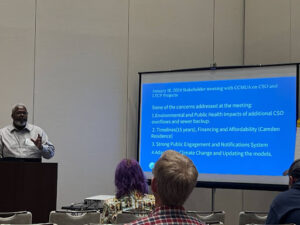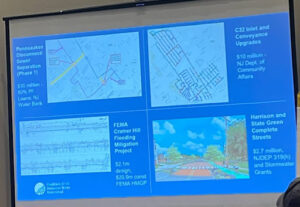Photo courtesy of Paula Figueroa-Vega and New Jersey Future.
The 2024 Delaware River Watershed Forum, hosted by the Coalition for the Delaware River Watershed, provided a platform for insightful discussions and presentations centered on community-driven actions to address water management issues. One particularly engaging session titled “Community Actions Driving Improved Water Management: Lessons from Camden, NJ” held on September 26, 2024, shed light on the innovative strategies and collaborative efforts of community organizations, nonprofits, and municipal agencies in Camden to tackle Combined Sewer Overflows (CSOs) and their impact on the region’s homes, waterways, and outdoor recreation. Their initiatives revolved around community-driven actions, environmental justice, and climate resilience. This session aligned with Jersey Water Works’ efforts to address combined sewer overflows.
The speakers highlighted their innovative methods, successes, and ongoing work to ensure the safety of public spaces, properties, and people.
Kevin Barfield of Clean Air Camden emphasized the need for inclusive discussions and heightened awareness regarding basement flooding caused by CSOs, particularly during storms. He called for more comprehensive information sharing and learning from those directly affected.

View full image here.
Doug O’Malley from Environment New Jersey exhibited a short film showcasing the region’s environmental challenges and opportunities, with a focus on accessing the Cooper and Delaware Rivers. This visual perspective provided compelling insight into the ongoing efforts to address these challenges.
Saraly Gonzalez highlighted recent investments in waterway access for recreation and the work of UrbanPromise, a youth organization, on impactful student activities on the waters, emphasizing the importance of clean water for youth and public programs. The engagement of youths as River Guides and student employees was particularly noteworthy as it aims to cultivate stewards of the rivers and the environment.
Prem Trivedi, Director of Science and Outreach, discussed the significance of the coordinated bacteria monitoring program being conducted by Riverways Collaboration, underlining the importance of viewing the river as a connector and stressing their commitment to water quality monitoring.
The session underscored the significance of engaging the younger generation in water management efforts. Initiatives such as organizing tours and activities, utilizing social media, and offering badges for participation have played a crucial role in fostering a sense of ownership and connection to the water among the youth.
Lu Bivona, Public Engagement Coordinator from Camden County Municipal Utilities Authority (CCMUA) provided valuable insights into the progress of reducing CSOs and plans to exceed the US Environmental Protection Agency’s (EPA) 85% capture requirement. The CCMUA’s approach, which includes leveraging mandates and seeking funding opportunities, has resulted in numerous completed green infrastructure projects initiated by Camden SMART in 2011. Detailed information below was captured from presentation slides:
The CSO regulation in Camden includes the following timeline:
- 1994: EPA Issues CSO Control Policy
- 2015: CSO Controls Mandated in 2015 by New Jersey Department of Environmental Protection (NJDEP) Permits
- 2018: System Characterization Report
- 2020: SIAR (Final) Report – lays out the Long Term Control Plan (LTCP)
- 2021-2022: Review and incorporation into the 2024 permits
- 2023-2024: Extensive discussion with questions regarding LTCP and whether a revision is needed
While questions remain, CCMUA reported the following completed work:
- Complete system cleaning
- Plant updated to 185 MGD wet weather
- Ten percent disconnection of impervious areas

View full image here.
The CCMUA is also working on several different projects which include
- Pennsauken Disconnect/Sewer Separation ($30 million- 80% PF loans, NJ Water Bank)
- C32 Inlet and conveyance upgrades ($10 million – NJ Department of Community Affairs)
- FEMA Cramer Hill Flooding Mitigation Project ($2.1 million design, $20.9 construction FEMA HMGP)
- Harrison and State Green Streets ($2.7 million, NJDEP 319(h) and Stormwater grants)
CCMUA also has several projects on the horizon, including the U.S. Army Corps of Engineers (USACE) section 219 component, Penn Disconnect Phase 2, Cooper River; Drexel climate-informed modeling; and other programs such as Cleaniet and Remote Flood Sensing, as well as regulatory requirements such as PFAS and climate adaptation.
While the progress in water management and recreational activities in the region was acknowledged, challenges persist. Notably, the CCMUA’s wait for their CSO permit from the New Jersey Department of Environmental Protection, due a year ago, has been compounded by delays from concerned regional partners. The session highlighted the need for political will and navigating funding opportunities to advance the goals of making rivers fishable and swimmable.
The commitment and dedication of advocates and river stewards, as evidenced by the passionate presentations at the conference, reflect a steadfast pursuit of a sustainable and resilient future for the Delaware River Watershed. Year after year, these efforts demonstrate a collective determination to overcome challenges and champion the region’s water resources.To learn more about Jersey Water Works efforts in addressing combined sewer overflows, click here.
